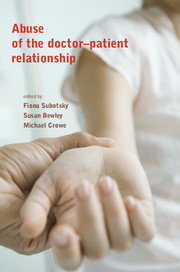Book contents
- Frontmatter
- Contents
- List of figures, tables and boxes
- List of contributors
- Foreword
- Introduction: mapping the territory
- 1 The ethical importance of boundaries to intimacy
- 2 The patient's perspective: impact and treatment
- 3 Teaching ethics and ethical behaviour to medical students
- 4 With the benefit of hindsight: lessons from history
- 5 The prevalence of boundary violations between mental health professionals and their clients
- 6 Psychiatry: responding to the Kerr/Haslam Inquiry
- 7 The general practitioner and abuse in primary care
- 8 Boundaries and boundary violations in psychotherapy
- 9 Sexual therapies: ethical guidelines, vulnerabilities and boundaries
- 10 Obstetrics and gynaecology: a special case?
- 11 Nurses as abusers: a career perspective
- 12 Medical management: governance and sexual boundary issues
- 13 Dealing with offending doctors: sanctions and remediation
- 14 Defending doctors: the protection society's experience
- 15 Regulation and its capacity to minimise abuse by professionals
- 16 The role of the General Medical Council
- Appendix 1 Extract from Vulnerable Patients, Safe Doctors
- Appendix 2 Codes of ethics of psychiatric associations in other countries
- Appendix 3 Guidance from the Council for Healthcare Regulatory Excellence
- Appendix 4 Examples of determinations by the General Medical Council's Fitness to Practise panels
- Appendix 5 Website resources and information
- Index
- Plate section
9 - Sexual therapies: ethical guidelines, vulnerabilities and boundaries
Published online by Cambridge University Press: 02 January 2018
- Frontmatter
- Contents
- List of figures, tables and boxes
- List of contributors
- Foreword
- Introduction: mapping the territory
- 1 The ethical importance of boundaries to intimacy
- 2 The patient's perspective: impact and treatment
- 3 Teaching ethics and ethical behaviour to medical students
- 4 With the benefit of hindsight: lessons from history
- 5 The prevalence of boundary violations between mental health professionals and their clients
- 6 Psychiatry: responding to the Kerr/Haslam Inquiry
- 7 The general practitioner and abuse in primary care
- 8 Boundaries and boundary violations in psychotherapy
- 9 Sexual therapies: ethical guidelines, vulnerabilities and boundaries
- 10 Obstetrics and gynaecology: a special case?
- 11 Nurses as abusers: a career perspective
- 12 Medical management: governance and sexual boundary issues
- 13 Dealing with offending doctors: sanctions and remediation
- 14 Defending doctors: the protection society's experience
- 15 Regulation and its capacity to minimise abuse by professionals
- 16 The role of the General Medical Council
- Appendix 1 Extract from Vulnerable Patients, Safe Doctors
- Appendix 2 Codes of ethics of psychiatric associations in other countries
- Appendix 3 Guidance from the Council for Healthcare Regulatory Excellence
- Appendix 4 Examples of determinations by the General Medical Council's Fitness to Practise panels
- Appendix 5 Website resources and information
- Index
- Plate section
Summary
Introduction
Sexual problems and their management require a particular sensitivity in the therapist because the subject matter of the discourse between the client (or patient) and the therapist (or doctor) is the intimate sexual interaction of two people. The areas being discussed are rarely if ever spoken about in a serious way outside the intimate relationship itself. In some types of therapy a physical examination also has to take place. Here, too, sensitivity has to be exercised to avoid embarrassment and to put the patient at his or her ease while the examination is taking place or the devices to restore function are being demonstrated.
Background
The earliest form of sexual therapy in the UK was carried out at the Institute of Psychosexual Medicine (Tunnadine, 1970). The therapists were predominantly general medical practitioners trained by the psychodynamically oriented Dr Michael Balint. He used a ‘seminar’ method, in which groups of doctors met together with a supervisor. Many of the patients, and most of the doctors, were female, and the doctors were encouraged to carry out a vaginal examination, which could produce a ‘moment of truth’ in which the patient would reveal the reasons behind her presenting sexual problem. The method is still practised, but only in a minority of settings.
The foundations of sexual therapy as most widely practised today were put in place by Masters & Johnson (1970), who instituted the concept of the couple as the ‘unit’ for treatment, and used a combination of face-toface meetings between the couple and two ‘co-therapists’ with homework exercises for the couple. Masters & Johnson used a rather unusual approach in which the couple stayed at a hotel in the city where the therapy took place, and attended the clinic every day for 2 weeks. Their methods have been imitated in many different settings, but in most of these the couples have attended once or twice a week at a clinic within travelling distance from their home address.
Sexual therapy takes many different forms, and there are many different professionals involved in the field.
- Type
- Chapter
- Information
- Abuse of the Doctor-Patient Relationship , pp. 104 - 113Publisher: Royal College of PsychiatristsPrint publication year: 2010



